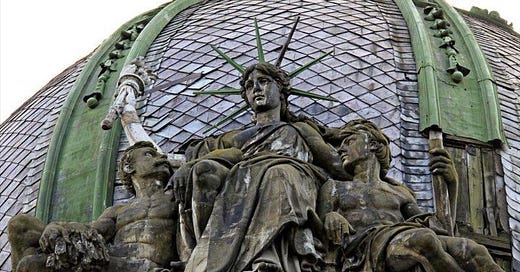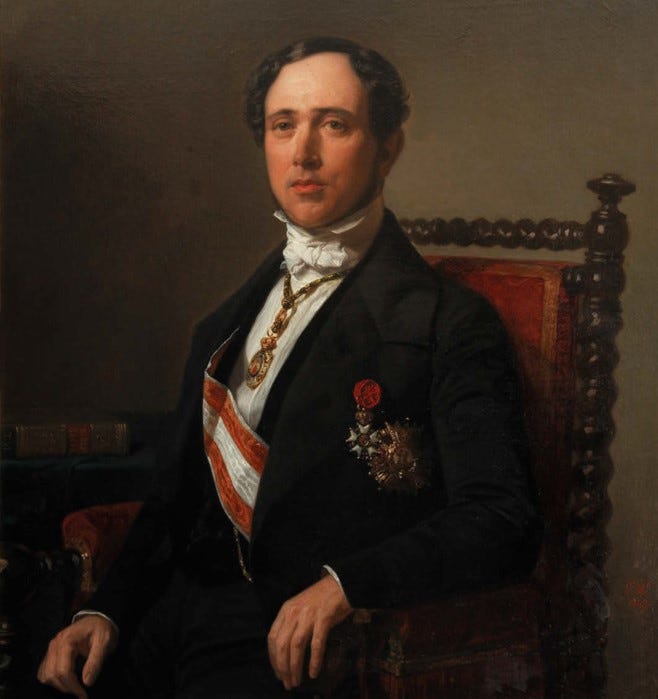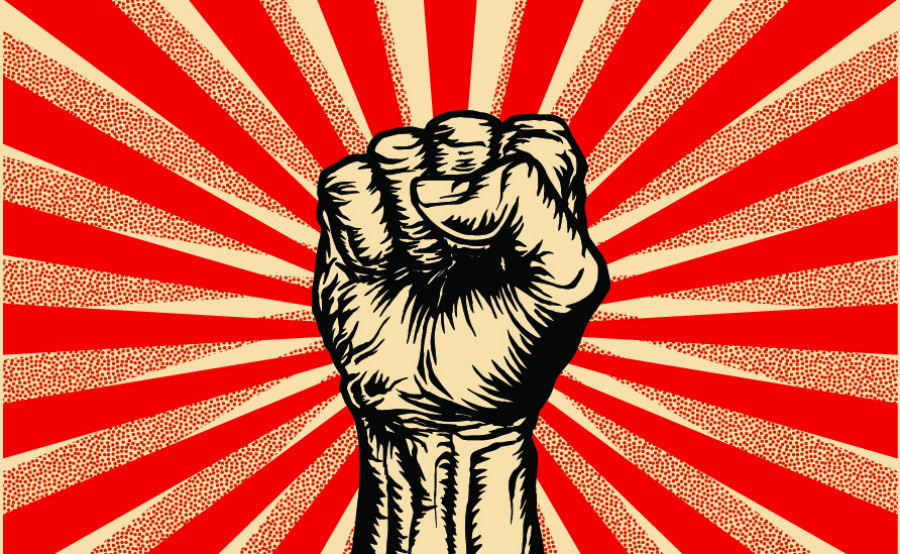The centuries since the French Revolution have been plagued by the twin demons of Liberalism and Socialism and their attempt to destroy the Catholic spirit of Europe. Such is the thesis of the counter-revolutionary philosopher Juan Donoso Cortés. He expounds the matter in his great work Essays on Catholicism, Liberalism and Socialism (1862). The book shimmers with beautiful prose and powerful thought, guided by deep theology. Cortés shows how the political questions cannot be answered without understanding matters more fundamental.
Impotent for good and evil
Cortés argues man’s free will in all its mysteriousness is the masterpiece of God’s creation. While it represents our absolute imperfection and rebelliousness, at the same time it constitutes our relative perfection and blessed role in the universe. Properly understood, free will means the combination of will and understanding (not free choice). Jesus taught us that it is truth that sets us free. But of course truth is not a matter of choice.
Right next to free will there exists a natural repulsion between truth and human reason. Our reason hates the truth and loves absurdity. This is because truth always entails submission and kills our pride. The solution to the issue is faith – man’s understanding is left confused and despairing if evidence is all it is offered and all it clings to. Without faith it cannot even accept the evidence.
Revealingly, liberalism as an ideology entails the worship of choice instead of the worship of truth. It is an ideology devoted to the adoration of absurdity. Cortés points out that this egoistic worship of choice and indeterminacy combined with a lack of learning make liberalism the most sterile of all political schools. It knows nothing of good and evil, almost nothing of God, and very little of man.
“Impotent for good, because devoid of all dogmatic affirmation, and for evil, because all absolute negation horrifies it.”
This internal weakness is powerfully illustrated by a liberal society’s lack of confidence in its own laws. In reality, human law only has power when it works under the auspices of Divine law. Even liberal governments are instinctively aware of this. It is why when they lose confidence in God, they soon lose confidence in their laws.
Death penalty is the case in point. It is the punishment of punishments, related to the very deepest expiations and penances. Its absoluteness terrifies liberals, who hate all that is absolute. But the price paid for its denial is heavy: a society that suppresses the death penalty will in time suppress all penalties.
“Liberalism only becomes dominant where society is on the wane. The period of its domination is that transitory and fugitive time when the world does not know whether to go with Barabbas or with Jesus, and is in a state of suspense between a dogmatic affirmation and a supreme negation.”
The main goal of liberalism is to delay and prevent the arrival of radical negations or affirmations. Its prime means for ensuring that goal is to confuse thought and spread skepticism to enfeeble understanding and conviction. Everlasting discussion, argument, and ‘working up of pros and cons’ is what liberalism adores. But Corte’s finds this very dangerous.
“Discussion is the title under which Death travels when he seeks to avoid recognition. Adam was only lost when he entered into discussion with the devil. Later, they tell us, this same demon appeared to Jesus in the desert, provoking him to a spiritual combat, or, as we may call it, a discussion.
Liberals are too timid to deny God altogether, and they know they still depend on his authority because they have none of their own. Thus they tend to settle for reducing God into a private matter, an abstraction, a distant deity, an impersonal legitimizer. But affirming the liberal God is same as to deny the real God. This makes me think of the liberal “conversions” of the Intellectual Dark Web celebrities.
“To affirm Him dogmatically, after having dogmatically despoiled Him of all His attributes, is a contradiction reserved for the Liberal school, the most contradictory among the rationalistic schools.
What it does with God in the religious, it does also in the political order with the king and with the people. There is no Liberal principle which is not accompanied by a counter principle which destroys it.”
Hence, Liberalism may sometimes espouse monarchy, but then it is immediately ready to establish ministerial or parliamentary control, removing power from the monarch. Often this method of politics is referred to as “checks and balances”, something Liberals love. This methodology means Liberals are never consistently for one thing, and instead hinder all powers and institutions by establishing contradictory ones. It is an ideology of sweet paralysis.
The paralysis in turn leads to Liberalism’s most characteristic attribute: corruption. The different checks and balances – the deliberately set up opposing forces within society – always work to corrupt each other through political horse trading, empty promises, and, above all, compromising. All the endless compromises lead to a dysfunctional pseudo-society whose very spirit is compromised.
“There is only one power for which the Liberal school has not sought its corresponding equilibrium – the power of corruption. Corruption is the god of the school, and as a god, it is in all places at one and the same time.
For this reason all the societies which fall under the domination of this school die the same death – all die gangrened.”
Satanic theology
Socialism is made of sterner stuff than Liberalism. This is because Socialism has real convictions, it has a theology. Where liberals doubt and hem and haw, vacillate, and relish internal contradictions, Socialists go straight for the problems and propose decisive, absolute solutions. Socialism also dares to define good and evil clearly (according to its own logic) and to offer a redemptive solution.
“Socialism is strong, only because it is a theology; and it is destructive, only because it is a satanic theology.”
Socialistic thinking will always trump Liberal thinking, because Socialists are theological, whereas Liberals are skeptical and anti-theological. But both are defeated by Catholicism, because it is at once theological and divine. Cortés points out how the Socialists deep down understand this hierarchy of power. They know Liberals are weaker than them, and thus feel only contempt for Liberalism. Equally, they instinctively realize the Catholic position is stronger than the Socialist one, and thus they have only burning hatred for the Church.
One strength of Socialism when compared to Liberalism is its consistency. But Socialism is not free of crucial contradictions. The major one being its belief in equality, or general human solidarity, the most impossible of all solidarities, constituting a shared heritage of all all the children of the French Revolution.
“To believe in the equality of all men, when we see them all unequal. To believe in liberty, when we see slavery established in all parts. To believe that all men are brothers, when history tells all are enemies. To believe that humanity is my center, when I constituted myself the center of all.
And finally, to believe that I should believe these things, when they are proposed to me by those who tell me that I should believe only in my own reason, which contradicts all the things they propose to me, is an absurdity so stupendous that I stand mute and astounded in its presence.”
Liberals and Socialists share a hatred of family and nationhood, for similar rationalistic, pro-equality reasons. But as usual, Socialists are able to be absolute and actively destructive, where Liberals are committed to their internal contradictions, and the spreading of enfeeblement and paralysis.
Both Liberals and Socialists understand that nations and especially families stand in the way of equality and liberty. In the long run families will always generate nobility, if allowed to operate unmolested. Even more terrifyingly, the family is the ultimate crux question. Sacredness and holy mysteries come built in: if you truly affirm the family, you will end up in affirming the Church.
“If we affirm the family, we must afterwards affirm, one way or another, all that Catholicism affirms, and all that Socialism denies. In fine, every affirmation of man, no matter how it is made, is finally resolved into the affirmation of Adam the man of Genesis.”
Socialism is bold in the war it wages. It does not flinch, mince words, or delude itself when faced with the necessity of destroying the family structure. But beneath all its rationalistic confidence lies the fundamental weakness of nihilism.
“It is the fate of all rationalistic ideology, because nothing is more natural and more logical, than that those who separate from God should end in nothing, as there is nothing beyond God.”
New Auroras
Christ allows us to not only avoid the terrified indecisiveness of the Liberal, but also the satanic solutions of the Socialist. With Christ we can look at the problems straight in the face, and from Him we can gain the proper answers.
Why is the world so broken? Because man has the mysterious power to turn good into evil (where God retains the opposed, equally mysterious power of turning evil into good).
How to deal with unhappiness? Accept the power of approaching misfortune as a purposeful chastisement. A chastisement you can submit to and suffer through, where faceless misfortune is arbitrary and fundamentally invincible.
How to come to terms with human nature? Begin by realizing that without the Incarnation the reptile you tread upon would be less despicable than man. Hence, the human dignity you witness every day is a greater miracle than the Virgin birth.
How can we be redeemed? With Adam man renounced his deification, so God had to become a man, allowing the relationship to mend, and opening us a new path to deification. We were condemned by our corporate representative Adam. And we are redeemed by our corporate substitute Jesus.
Why is this so? It is explained by the final words of Jesus on the cross: “It is consummated”. Meaning:
“I effected with my love what I could not with my justice, nor my mercy, nor my wisdom, nor my omnipotence. For I blotted out sin which obscured the divine majesty and human beauty, freed humanity from its shameful captivity, and restored to man the power of being saved, which he had lost through sin.
Now my spirit can descend to fortify, embellish, and deify man, for I have drawn him and united him to me with a powerful and loving bond.”






